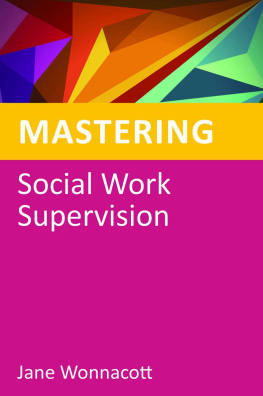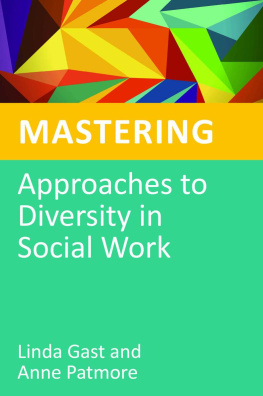Mastering Social Work Values and Ethics
Mastering Social Work Skills series
Edited by Jane Wonnacott
This series of short, accessible books focuses on the everyday key skills that social workers need in order to practise effectively and ensure the best possible outcomes for service users. Easy to read and practical, the books feature key learning points, practice examples based on real-life situations, and exercises for the reader to enhance their learning. The books in this series are essential reading for post-qualifying social work students and social work practitioners.
Jane Wonnacott is Director of In-Trac Training and Consultancy, UK.
other books in the series
Mastering Social Work Supervision
Jane Wonnacott
ISBN 978 1 84905 774 1
eISBN 978 0 85700 403 1
Mastering Approaches to Diversity in Social Work
Linda Gast and Anne Patmore
ISBN 978 1 84905 224 5
eISBN 978 0 85700 458 1
MASTERING
Social Work Values and Ethics
Farrukh Akhtar
Foreword by Hilary Tompsett
Jessica Kingsley Publishers
London and Philadelphia
The bullet lists on pp.9091 have been printed with kind permission from GSCC.
Table 4.1 on p.97 has been used with kind permission from Nikki Owen and Audience with Charisma Ltd, 2011.
Figure 5.1 on p.112 has been used with kind permission from Oxford University Press.
Figure 5.5 on p.123 has been used with kind permission from the National Association of Social Workers.
First published in 2013
by Jessica Kingsley Publishers
116 Pentonville Road
London N1 9JB, UK
and
400 Market Street, Suite 400
Philadelphia, PA 19106, USA
www.jkp.com
Copyright Farrukh Akhtar 2013
Foreword copyright Hilary Tompsett 2013
All rights reserved. No part of this publication may be reproduced in any material form (including photocopying or storing it in any medium by electronic means and whether or not transiently or incidentally to some other use of this publication) without the written permission of the copyright owner except in accordance with the provisions of the Copyright, Designs and Patents Act 1988 or under the terms of a licence issued by the Copyright Licensing Agency Ltd, Saffron House, 610 Kirby Street, London EC1N 8TS. Applications for the copyright owners written permission to reproduce any part of this publication should be addressed to the publisher.
Warning: The doing of an unauthorised act in relation to a copyright work may result in both a civil claim for damages and criminal prosecution.
Library of Congress Cataloging in Publication Data
Akhtar, Farrukh Nahid, 1966-
Mastering social work values and ethics / Farrukh Nahid Akhtar.
pages cm
Includes bibliographical references and index.
ISBN 978-1-84905-274-0 (alk. paper)
1. Social service--Moral and ethical aspects. I. Title.
HV10.5.A44 2012
174.93613--dc23
2012041885
British Library Cataloguing in Publication Data
A CIP catalogue record for this book is available from the British Library
ISBN 978 1 84905 274 0
eISBN 978 0 85700 594 6
Printed and bound in Great Britain
Foreword
As Chair of JUC SWEC (Joint University Council Social Work Education Committee) I am very aware that social work programmes, students and practitioners will be thinking how they can engage with the social work reforms in qualifying social work education and practice and in very changing contexts.
This book presents in a very readable and practical format an introduction to values and ethics across the professional lifespan and taking account of organisational contexts. It will be of particular value to new social work students meeting the new requirements (Health and Care Professions Council [HCPC] Standards of Proficiency/Code of Conduct, Performance and Ethics, and The College of Social Works Professional Capabilities Framework [PCF]). It will also be relevant to practitioners looking for material to assist them with reflections on practice as they prepare for re-registration with the new regulator (HCPC) and think about their careers in relation to the PCF.
The interplay between the personal and professional highlights that social workers bring their own beliefs, attitudes and spirituality to the consideration of issues, while also seeking to develop informed and systematic approaches to improving their understanding and professional judgements. Key to this is the ability to reflect critically, a skill which is helpfully developed through the practice related case studies, matrices for analysis, up to date contextual material, which integrates the new requirements and standards, each chapter also contains key theoretical perspectives and useful tips that will help direct practitioners to further resources and tools to support professional development, self-management and well being in relation to caseload demands, dealing with stress, and direct practice challenges.
This book will provide a valuable new text in the literature of values and ethics and stimulate readers to explore wider and complementary texts dealing with some of the theoretical dimensions in more depth or detail.
Professor Hilary Tompsett
Kingston University and St Georges, University of London
Series Editor Foreword
When social workers have confidence in their own skills, purpose and identity, and in the system in place to back them up, they have a huge amount to offer. They collaborate effectively with other professionals and adapt to new roles and expectations. Most importantly, they forge constructive partnerships with people who find themselves vulnerable or at risk and make a sustained difference in their lives .
(Report of the Social Work Task Force 2009, p.5)
This book forms part of a series which aims to increase social work confidence through exploring the essential skills that social workers need to do their job, and to give accessible, practical ideas based on evidence from research and practice.
The series challenges the view that social work is about doing the simple things well, a view that has taken hold in some circles since the publication of the Laming report in 2003. Social work is not simple; it is a complex activity, and social workers are working with risk and uncertainty on a day to day basis.
It is the premise of this series that good social work involves the capacity to develop and maintain relationships, manage the emotional dimension of the work and make judgements and decisions often in the light of conflicting information. This is demanding work and will only be effective if social workers are encouraged to reflect critically on their practice and continually develop their knowledge and skills. Too often the time for reflection and skill development is minimal, and social workers rely on prescriptive procedures which do not always assist the creativity and critical thinking which is fundamental to good, safe practice.
The starting point for authors of this series is a positive expectations model, which is based on the premise that social workers want to do a good job and need flexible tools and frameworks to help them practise within the challenging environment within which they work. The authors are experienced social work trainers and practitioners, and the content of each book is based on material that has been extensively tested with front line practitioners and their managers.





